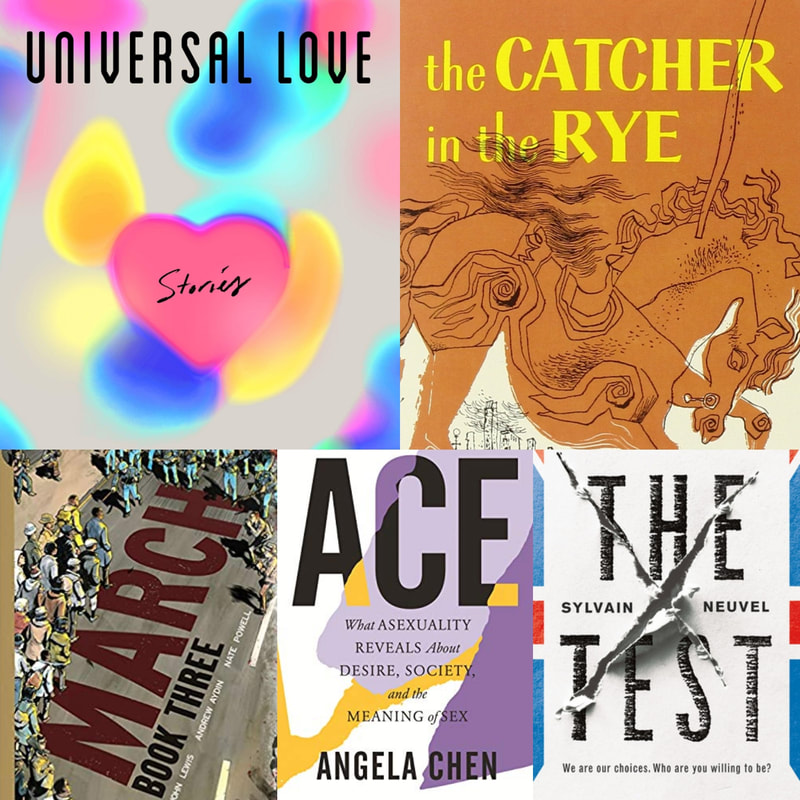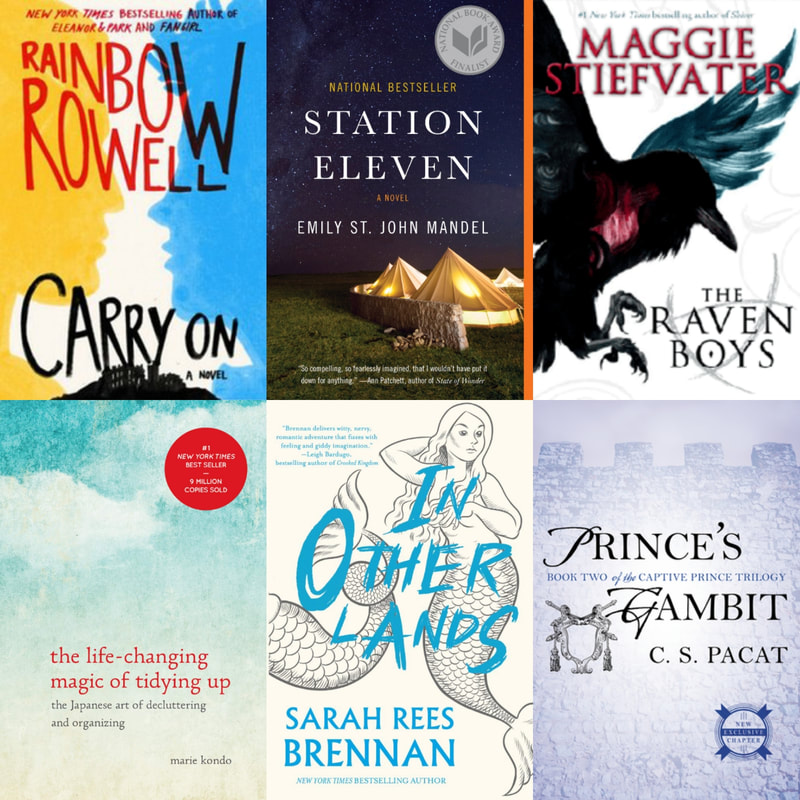|
Following are my completely subjective favorite reads of 2020. Books didn’t have to be published in 2020, just read by me this year. So in no particular order, here we go… Universal Love: Stories by Alexander Weinstein An amazing book of short stories all centered around the theme of how near-future technologies will change and shape the ways we humans connect to each other -- from romantic, friendship, to familial. These stories hit the sweet spot between exploring big ideas while grounding them in the personal stories of the main characters. The Test by Sylvain Neuvel This novella about a citizenship is tense and suspenseful, and chock-full of social commentary. Because Idir is such a likable main character it made the stakes so much higher because I just didn’t want any of the bad stuff that was happening to him to be happening to him. I don’t want to give away too many of the twists, but just know the plot is a lot more than what it seems in the opening chapters. Ace: What Asexuality Reveals About Desire, Society, and the Meaning of Sex by Angela Chen This isn’t just a book about what asexuality is as a sexual orientation or what it is to the author (though it covers both) but an exploration of when we take asexuality into account how it makes us re-exam how we as a society assume how everyone feels or should feel about sex and relationships, as well as what it is the “right” or “healthy” way to engage in these. Long Way Down by Jason Reynolds I read this masterpiece of a book-in-verse by Jason Reynolds in one day. When a teenage boy’s brother is killed in gang-related violence, he has to decide whether or not to continue the cycle by avenging his death. Takes place primarily during the length of an elevator ride down the apartment building. Powerful and heart-wrenching. March: Book 1, 2, 3 by John Lewis I finished reading this series of memoir graphic novels coincidentally just around John Lewis’ death. Framed around Obama’s 2009 inauguration, Lewis reflects back on his time and work in the Civil Rights Movement, providing insight and depth I have never gotten from the history textbooks: the inner politics of the different civil rights organizations, the philosophy of nonviolent protests, the downright brutality of protestors and civil rights workers faced. It’s a history lesson that’s 100% percent applicable to today. The Catcher in the Rye by J.D. Salinger Technically a reread, but the first time I read it as an adult (the real first time I read it was in high school), but it has to be included because reading this classic novel a second time blew my mind. Main character and narrator Holden Caulfield is either adored by readers for his unique perspective on the world or loathed by readers for his unique (read: pretentious) perspective on the world. Yes, Holden is pretentious (he’s a #teenager with #opinions); however, it slowly dawned on me during this read through that this story of young man’s weird little weekend romp in New York City after he flunks out of yet another school is actually chronicling his mental breakdown as he is desperately trying to connect with people while clearly not over the death of his younger brother. It is, in fact, quite heartbreaking. And I feel like this a whole giant layer of the story that is usually ignored in the pop culture discourse in favor of deciding who is the real phony. If this is a novel you read and rolled your eyes over in high school, it is worth another look.
0 Comments
My completely subjective list of my favorite books I read this decade and a few sentences to describe them. 5. Carry On by Rainbow Rowell & In Other Lands by Sarah Rees Brenan I put these two titles in a tie because they are so similar in concept and different in execution, and I love them both a lot. These two titles are send-ups/twists/subversions/homages to YA fantasy fiction of the last decades, with Carry On specific to Harry Potter and In Other Lands pulling from several sources. They both question who the real heroes and villains are, tell epic series-length plots in one book, have a character grow wings near the end (the strangest of the likenesses), and add in queer representation that this genre has been lacking. Despite those similarities, they are very much both their own separate books in terms of style, theme, and characters, and both are deliciously fun reads with a strong heart pumping at the center. 4. The Life-Changing Magic of Tidying Up by Marie Kondo I know Marie Kondo’s tidying philosophy has been the butt of a lot of jokes when reduced to soundbites, but if you haven’t read it and tried it, then you’re all just a pack of big meanies who don’t understand. :P. I used Kondo’s method to clean out my childhood bedroom post-college (which ended up being very useful to both me and my parents when I moved out a few years later) where I had pack-ratted up a lifetime of stuff. While I rolled my eyes when reading the corny sounding suggestions of Kondo, like thanking the items you were getting rid of, in practice it really helped the emotional processes – whether sentimental attachment or guilt – of getting rid of stuff. I still use her methods of joy-bringing to cull my stuff every so often and the way she teaches you to fold laundry to fit in your bureau drawers ended up being a game-changer. Of all the books I read this decade, this one affected my day-to-day life the most. 3. Prince’s Gambit by C.S. Pacat This middle volume of the Captive Prince trilogy has a little bit of everything that makes this series such an engrossing read: political intrigue, sword fights, hidden identities, enemies to friends to lovers trope, one of those scenes were they do a game of chase on the roof tops of a town at night, and layers and layers of themes. It’s the payoff to the slow build of the first book, leaves you with cliffhangers for the third book, and is overall a tightly written story that maintains both plot and character tension, and always reveals more details and nuances through rereads. (But as much as I love it, don’t jump into reading this series without talking to someone whose read it first because the first book can be pretty off putting if you’re not prepared for the heaviness of the content.) 2. Station Eleven by Emily St. John Mandel It’s hard to explain what makes this book so good. It’s a post-apocalyptic story, but like a literary one? Crickets. No, I swear it’s great. Because it’s not a story about warfare and chaos, it’s about the fight to survive after the initial chaos where survival is more the act of living but found in art and music and the tangle of human bonds. Post-apocalyptic stories are usually depressing, about societies falling apart, but this one is about hope and societies rebuilding. 1. The Raven Boys by Maggie Stiefvater I’m letting the first book in this four-part stand in for the rest of this contemporary, character-driven fantasy series, because otherwise this list might’ve ended up just all four books of The Raven Cycle. If you like stories about ghosts, psychics, and/or dead Welsh kings written by an author who knows how to turn a clever and powerful phrase, check this beautiful series out. The amount of magic and character-depth Stiefvater can pack into these books is astounding. Ever since I read it for the first time in 2016, I have been obsessed. Interested in seeing more of my opinions about books? Check me out on goodreads. |
Margery BayneInsights from the life of an aspiring, struggling writer; a passionate reader, and a working librarian. Archives
June 2022
Categories
All
This website uses marketing and tracking technologies. Opting out of this will opt you out of all cookies, except for those needed to run the website. Note that some products may not work as well without tracking cookies. Opt Out of Cookies |


 RSS Feed
RSS Feed